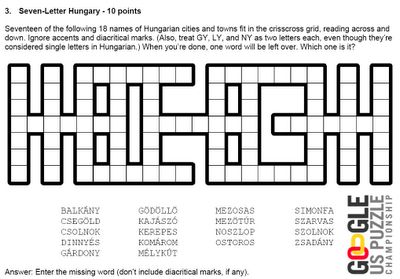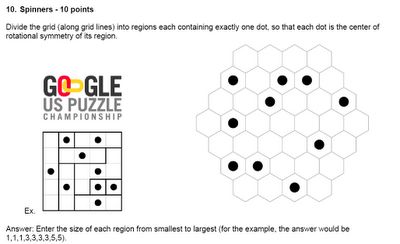Enthusiastically Simple
A transcript of the life that I strive to keep Fully Simple yet Simply Full.
Tuesday, June 28
Sunday, June 19
Saturday, June 18
Can't Think of a Title...My Brain's Tired
 Last November I wrote about the US Puzzle Championships. The test, sponsored by Google, is 150 minutes in length and consists of between 20 and 25 puzzles. Anyone can participate, but only the top few will represent the United States in the World Puzzle Championships, to be held in Hungary this fall. The puzzles require no tools or prior knowledge, save for basic arithmetic, and rely simply on pure logic and reasoning. Ranging in difficulty, the puzzles are worth anywhere from 1 to 35 points; the more time-consuming the puzzle, the more points a correct answer garners. Some puzzles may also be worth 'bonus points', or points not symbolic of difficulty, that are added onto a puzzle simply because the test-makers want you to try them. Answers are so specific, however, that guessing is near impossible and not worthwhile, as an incorrect solution incurs a 5 point penalty. The test is only held once a year, usually in the summer, and takes place entirely online at the US Puzzle Championship website. This moning, I competed.
Last November I wrote about the US Puzzle Championships. The test, sponsored by Google, is 150 minutes in length and consists of between 20 and 25 puzzles. Anyone can participate, but only the top few will represent the United States in the World Puzzle Championships, to be held in Hungary this fall. The puzzles require no tools or prior knowledge, save for basic arithmetic, and rely simply on pure logic and reasoning. Ranging in difficulty, the puzzles are worth anywhere from 1 to 35 points; the more time-consuming the puzzle, the more points a correct answer garners. Some puzzles may also be worth 'bonus points', or points not symbolic of difficulty, that are added onto a puzzle simply because the test-makers want you to try them. Answers are so specific, however, that guessing is near impossible and not worthwhile, as an incorrect solution incurs a 5 point penalty. The test is only held once a year, usually in the summer, and takes place entirely online at the US Puzzle Championship website. This moning, I competed.I woke up early (read: 9:30 on a Saturday) and prepared my supplies: scratch paper, pencils, pens, an eraser, and the Adobe Acrobat formatted test file. The test is actually available the day before test starts, but the password to open the encrypted file is not released until the 10:00 am start time.
I'd already worked on last year's test for fun and practice, so my plan for today was simple: answer first all the questions I knew I'd be able to answer (like Battleship), then go back to the puzzles variations I'd never seen before, like Factor Maze. Once the test started, however, I reverted to my methodical nature and started with question #1 and then went proceeded through the problems linearly, rather than skip around to the ones I knew I knew how to do. The new types of puzzles were just too much fun to pass up! Anyway, I'd start on one of these new problems, work on it for 10 minutes, not get anywhere with it, and then go on to the next one. I'd wasted about an hour and only solved two puzzles before realizing I was being an idiot. I then skipped around, knocked out a few more, and then my alarm buzzed to let inform me that I was almost out of time. I submitted my answers to be sure I they were in and then worked a little more on a problem I was frustratingly close to solving (Spinners) before time ran out.
After going back through the test in a more relaxed, time-independent fashion, I noticed that one of the problems I'd solved was wrong. -5 point penalty for that. I then saw a 25-point question and a 30-point question that I could've solved had I done them first, instead of working on three or four fruitless 10 and 15-point puzzles.
My goal after finishing last-year's test (for practice) was 50 points. Then, after seeing what questions would be on today's test (they posted what types of puzzles would be on the test yesterday), I increased my goal to 75. I'd be completely satisfied, however, with a score of 100.
Although answers have not yet been released and scores have not yet been posted, I know I got an 80. I would've had a 95 had I not missed one of the questions (10 points with a 5 point penalty), and after working through some of the other problems when the test had ended, realized that I probably would've scored a 155 had I stuck with my plan and worked on the higher-point, tried-and-true problems first. So, in all, I'm a little disappointed that I didn't do as well as I should have, but am glad to know that come next year, I'll be score enough to be on the "Top Scores" page!
Below are a sample of the puzzles that were on the test. If you're interested in printing out and solving some of the puzzles yourself, head to the test website and download the PDF file. The password to open it is: 2gr8work.
Good luck and have fun!
Read the rest...









